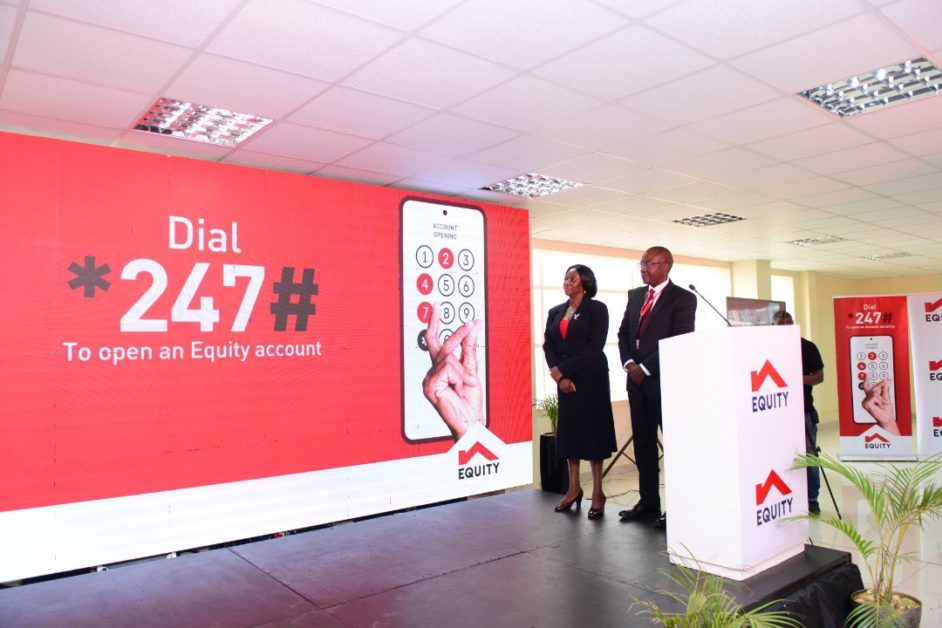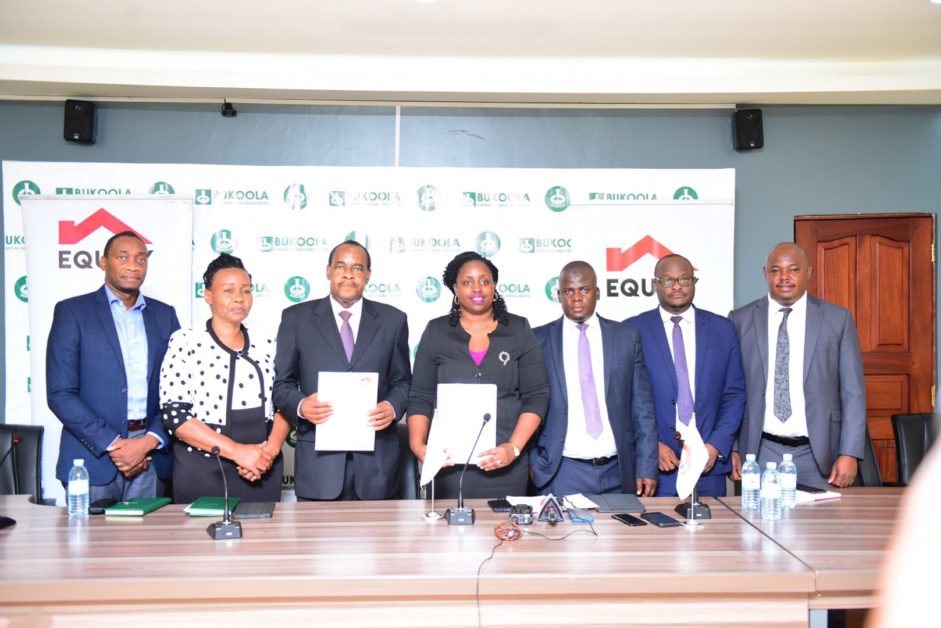Despite taking a 46.7% drop in 2022 net profit, Equity Bank Uganda still managed to make significant growth and key market share gains in customer deposits, lending, income and assets and capped off the year, by breaking into Uganda’s top 5 banks club.
In the just released results, Equity Bank reported a 21% growth in deposits from UGX 2.29 trillion to UGX2.76 trillion- an increase of UGX469.9 billion. This enabled Equity to leap from the 5th largest bank by deposits position, to the 3rd largest, overtaking standard Chartered Bank and Absa Bank Uganda.
Top of the market is Stanbic Bank (UGX6.13 trillion) and Centenary Bank (UGX3.9 trillion).
Except for Centenary Bank which grew its deposits by UGX722.7 billion, from UGX3.18 trillion to UGX3.9 trillion, Equity Bank in 2022 registered the second-biggest growth in deposits in absolute terms. For context, Equity Bank’s growth in deposits in 2022, is bigger than the entire deposits base of at least 10 commercial banks out of the 25!
Growth in deposits, according to Anthony Kituuka, the bank’s Managing Director, was fuelled by a 32% growth in customer numbers from 1.222 million to 1.613 million and a 39% growth in the number of agents from 5,572 agents to 7,727 agents as well as 6,048 merchants. The customer growth is also powered by the bank’s self-account-opening digital banking innovation via *247# launched in February last year.
Significant growth in deposits allowed the bank to grow its lending portfolio by 6%⏤ from UGX1.54 trillion to UGX 1.63 trillion- an increase of UGX87.9 billion, maintaining its 3rd place as the 3rd biggest lender, a position it broke into, in 2021.
This allowed the bank to increase its interest income on loans from UGX243.2 billion to UGX280.4 billion. Increased customer and customer transactions also boosted fee and commission income- the third biggest income line, from UGX41.2 billion to UGX54.9 billion. This and other income lines, drove a 22.6% growth in total income, from UGX382.7 billion to UGX469.2 billion, an increase of UGX86.5 billion. This earned the bank a 4th position as top earner, from the 6th position in 2021.
Despite the increase in income, the bank however saw an increase in provisions for bad and doubtful debts from UGX25.7 billion to UGX90.7 billion, partly emanating from an increase in NPLs from UGX78.8 billion to UGX277.8 billion. As a result, profit before tax dropped 52% from UGX 118.2 billion to UGX 56.4 billion while net profit dropped 46.7% from UGX86 billion to UGX45.8 billion.

Thanks to solid performance in deposits and lending, Equity Bank was able to register a 20% growth in total assets, from UGX2.82 trillion to UGX3.38 trillion- a growth of UGX557.7 billion. This is the second biggest growth in assets after Centenary Bank which grew its assets by UGX963.8 billion. Equity Bank moved from the 6th position to the 5th largest bank by assets.
In recognition of this, the Bank of Uganda has added Equity Bank to the list of Domestic Systematically Important Banks (DSIBs) for 2023, joining other Absa Bank, Centenary Bank, dfcu Bank, Equity Bank, Stanbic Bank, Standard Chartered Bank, and they jointly accounted for 64.6 per cent of total banking sector assets as at the end of December 2022.
A DSIB is a financial institution whose impairment or failure because of its size, complexity, substitutability and systemic interconnectedness, may trigger significant disruption to the financial system and economic activity.
Equity Bank’s growth is not surprising and is consistent with the bank’s steady 5-year double-digit compounded annual growth rate across all fundamentals⏤ 23.5% in assets (the highest in the industry), 18.5% in lending, 25.8% in deposits and 22.1% in total income.
Equity Bank’s rise is unprecedented. It is the only bank to grow from the bottom of the market to the top 5 industry players in just 15 years. Equity which entered Uganda, following the July 2008 acquisition of a 100% stake in Uganda Microfinance (UML), is a subsidiary of Equity Group Holdings Plc, a financial services company listed at the Nairobi Securities Exchange, Uganda Securities Exchange, and Rwanda Stock Exchange. In addition to Equity Bank Uganda, the Group has banking subsidiaries in, Kenya, Rwanda, Tanzania, DRC, and South Sudan, and a Commercial Representative Office in Ethiopia; with additional non-banking subsidiaries engaged in the provision of investment banking, custodial, insurance agency, philanthropy, consulting, and infrastructure services.
Equity Group is the largest bank in the region with assets of USD 12 billion. It is also the largest bank in terms of deposits, with a market capitalisation of USD 2 billion and a customer base of over 15 million. The group has 337 branches, 56,772 agents, 32,269 merchants, 697 ATMs and has widely adopted digital banking channels.
Resilient BusinessPerformance
Commenting about the results, Kituuka said this was “another year of continued growth in key areas.”
“Our overall performance demonstrates resilience in the face of economic contraction and other associated challenges experienced by the post-Covid19 pandemic. Our continued focus on operational efficiency and strategic growth initiatives have enabled us to deliver positive results for our shareholders and stakeholders and I am fully confident that the foundations we set in 2022, will help us deliver on our strategic priorities and further strengthen our financial performance.”

He said the bank in 2022, continued to invest in key areas of the business, including new product development and expansion into new markets. These investments, he said, have helped to drive growth and position the company for continued success in the future.
“With our significant investments in technology, prudent cost, and risk controls as well as robust systems, we are on the right track to even perform better in 2023,” said Kituuka, adding, “The company is committed to maintaining a strong financial position and will continue to pursue growth opportunities while remaining focused on delivering value to customers and shareholders.”
SharedProsperityBusinessmodel
To help mitigate the impact of the pandemic and help businesses recover fast and better, Kituuka said, Equity Bank had adopted a twin social and economic engine execution model, thus the 7 priority sectors for the bank⏤ Agriculture, Manufacturing, Trade, Energy and Environment, Education, Health, and Oil & Gas.
He also highlighted the bank’s Eazzy Stock⏤one of Equity Bank’s mobile phone-based collateral-free digital lending products, that allows businesses to access trade financing based on the exact value of their stock, both raw materials and finished products, as one of the key growth drivers. The target clientele for this product are Distributors, Dealers, stockists, or retailers who are onward sellers of products or services of an anchor or Manufacturer. He said Eazzy Stock was financing up to UGX10 billion daily in short-term loans.
Kituuka also highlighted the fact that the bank in 2022 stepped up its social impact investments inspired by the need to fulfil its commitment to promote inclusion, the transformation of lives and livelihood, enhancing human dignity and expanding economic opportunities in society with a bias for youth and women.
For example, over the last two years of the Covid19 environment, the bank offered free financial literacy offered to women, youth and refugees has increased from 45,000 to over 86,000 with credit support worth UGX21 billion to 17,000 youth and women.
Under the bank’s education and leadership pillar,⏤ the Equity Leaders Program launched in 2022, the bank continues to offer a paid internship, mentorship training and college counselling to S.6 graduates from across Uganda. In just one year, the program has admitted 225 students. To fuel the agricultural sector, the bank in 2022 continued to offer credit deliberately and intentionally to small-scale farmers, supporting up to 55,726 farmers, with credit worth UGX70.3 billion, and also established agriculture insurance products.

“Equity Bank Uganda continues to seek to do well while doing good, serving and supporting 100,000 households in 10 of the 12 refugee settlements in Uganda under the social protection programs aimed at moving them away from reliance to self-sustenance. Bank Branches have been opened and closed to major refugee settlements and 290 agents deployed to integrate refugees and host communities through financing, economic and commercial activities. In the financial year 2022, the bank made available loans worth UGX129.9 million to 42 VSLAs in refugee settlements, a bold move aimed at giving refugees financial independence,” Kituuka intimates.
In keeping with its promise to expand economic opportunities to all, the bank in 2022 continued to offer and create opportunities for the youth, giving free financial literacy to 63,879 young entrepreneurs and awarded credit worth UGX18.8 billion to different youth groups to support their businesses.
African Recovery and Resilience Plan
Equity Group in 2022 launched the African Resilience and Recovery Plan (ARRP), a private sector-focused stimulus package to accelerate economic recovery and resilience in the Eastern and Central Africa region as it recovers from the devastating health, social, humanitarian, and economic impacts of the COVID-19 pandemic.
“Under the Plan, Equity Group continues to make available USD 6 billion to up to 5 million MSMEs and 25 million individual borrowers for the next 5 years. The plan conceives that the 5 million businesses largely comprising MSMEs will create 50 million jobs, 25 million jobs directly, and an equal number of jobs indirectly as the ecosystems of business become more cohesive, connected, and ultimately synergise and grow,” Kituuka concluded.
